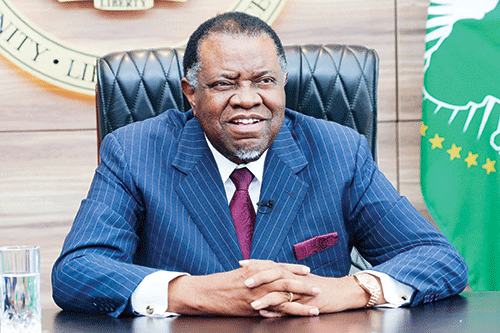Trade minister Lucia Iipumbu has emphasised the need for a speedy conclusion on trade in service negotiations, given that trade in service contributes immensely to Africa’s gross domestic product.
Iipumbu is in Accra, Ghana, for a meeting of African Continental Free Trade Area (AfCFTA) Council of Ministers responsible for Trade. The meeting, which started on Monday, was scheduled to conclude yesterday.
At the meeting the, AfCFTA Council of Ministers responsible for Trade were scheduled to consider outstanding issues on Rules of Origin for tobacco, sugar, textiles, clothing and automotive.
“Namibia seeks to expedite the conclusion regarding sugar negotiations by imploring member states to move towards a compromising situation of give and take, to make positive strides on the issue.
Conclusively, at the same gathering, the Council of Ministers will deliberate on the automotive package (consisting of the Automotive Strategy; Automotive Implementation Plan and proposed Rules of Origin), which aims to facilitate an agreement on the outstanding issues under automotive.
Namibia is likely to support the adoption to intensify advocacy on customs related matters, domestications of the AfCFTA instruments and engagements of stakeholders and business operators,” explained trade ministry spokesperson Elijah Mukubonda.
The African ministers are also expected to consider the Report of the 11th Meeting of the Senior Trade Officials and the Report of the 5th meeting of the Committee of Directors General of Customs.
The ministers will also be presented with the report of the AfCFTA Dispute Settlement Body.
Namibia is among the member states that have submitted their draft Schedule of Specific Commitments on Trade in Services to the AfCFTA Secretariat, which has been verified to meet the requirements and modalities for trade in service negotiations that member states should improve their offers at the World Trade Organisation (WTO).
Other member states that submitted the Draft Schedules of Specific Commitments include Djibouti, Democratic Republic of Congo, the East African Community, Egypt, Eswatini, Lesotho, Malawi, Mauritius, Seychelles, and Zambia, to name a few.
The AfCFTA agreement was officially launched at the 12th Extraordinary Summit of the African Union (AU) in July 2019. The launch included a number of instruments to facilitate the implementation of the agreement, focusing on the Rules of Origin, a trade-in-goods dashboard, a payment and settlements system, and a dashboard of the AU Trade Observatory.
Countries agreed that once some of the critical parts of the agreement (such as schedules of tariff concessions and services commitments, and policies around investment, intellectual property, and competition) were finalised, then continental trade could commence under the landmark agreement.
The AfCFTA agreement aims to establish a single market for goods, services, facilitated by movement of persons, to deepen African economic integration.
The agreement is also designed to facilitate sustainable and inclusive socio-economic development, gender equality and structural transformation of the state parties.


